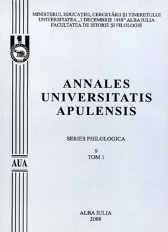Metaphor and Philosophy
Metaphor and Philosophy
Author(s): Natalia HadaSubject(s): Language and Literature Studies
Published by: Universitatea »1 Decembrie 1918« Alba Iulia
Keywords: conceptual metaphor; philosophy
Summary/Abstract: Looking at the history of philosophy since as far back as the Greek Presocratic thinkers (Thales, Anaximander, Heraclitus, Protagoras, Gorgias) the Metaphysical school (Socrates, Plato, Aristotle), through Empiricism (Bacon, Hobbes, Locke), Rationalism (Descartes, Leibnitz) or Enlightenment (Rousseau), Existentialism (Heidegger), Neo-Positivism or Neo-Pragmatism (Richard Rorty) until Structuralism (Levi-Strauss), Deconstruction (Derrida) and Post-Structuralism (Michel Foucault) one can distinctly notice certain aspects concerning metaphor. The most important one would be that philosophy as such has been defining itself around and by metaphor whether overtly so or, on the contrary strongly denying its truth and relevance as instrument of cognition or downright condemning its very status as anomaly or categorical mistake. Whichever the case may be, and mostly one can safely argue that the devaluation of metaphor actually has come to be a point of philosophical consensus, the reality is that none of these thinkers could escape its use both as means of persuasion and illustration and especially as instrument of cognition no matter how hard they may have struggled to.
Journal: Annales Universitatis Apulensis. Series Philologica
- Issue Year: 9/2008
- Issue No: 2
- Page Range: 189-196
- Page Count: 8
- Language: English

